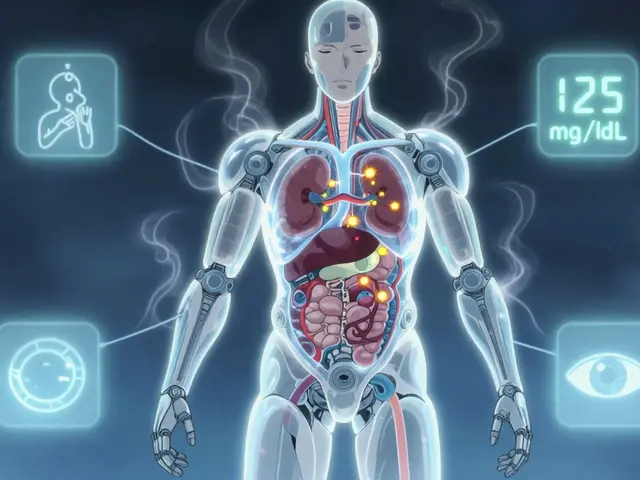An Introduction to Vestibular Migraines and Betahistine
Vestibular migraines are a type of migraine that can cause severe dizziness, vertigo, and balance problems. They can be incredibly debilitating and have a significant impact on a person's quality of life. If you're like me and have been struggling with vestibular migraines, you're probably on the lookout for an effective treatment option to help manage your symptoms. That's where Betahistine comes in. In this article, we'll explore how Betahistine works, its potential benefits, and why it could be a promising treatment option for vestibular migraines.
Understanding Vestibular Migraines
Before delving into the potential benefits of Betahistine, it's essential to understand what vestibular migraines are and how they differ from other types of migraines. Vestibular migraines are characterized by episodes of vertigo or dizziness that lasts from minutes to hours, often accompanied by migraine symptoms such as headache, sensitivity to light, and sound, and nausea.
The exact cause of vestibular migraines remains unclear, but they are believed to result from a combination of genetic and environmental factors. Some common triggers include stress, hormonal changes, certain foods or drinks, and changes in sleep patterns. As someone who suffers from vestibular migraines, I can attest to the fact that they can be incredibly unpredictable and challenging to manage.
What is Betahistine?
Betahistine is a medication that has been used for several decades to treat a variety of balance disorders, including Meniere's disease, which is characterized by episodes of vertigo, hearing loss, and tinnitus. It is an antivertigo agent that works by improving blood flow in the inner ear and stabilizing the sensory cells responsible for balance.
While Betahistine is not specifically approved for the treatment of vestibular migraines, its potential benefits have caught the attention of medical professionals and patients alike. As someone who has tried various migraine treatments with limited success, the possibility of finding relief with Betahistine is definitely intriguing.
The Connection Between Betahistine and Vestibular Migraines
So, how exactly does Betahistine relate to vestibular migraines? Well, the connection lies in the fact that both conditions involve the inner ear and its complex balance system. The inner ear is responsible for sending signals to the brain about our body's position and movement, enabling us to maintain balance and coordination. In vestibular migraines, it is believed that the migraine process disrupts the inner ear's normal functioning, leading to vertigo and other balance issues.
Given that Betahistine has been shown to improve inner ear blood flow and stabilize balance-related sensory cells, it stands to reason that it could potentially help alleviate vestibular migraine symptoms. This has led to increased interest in exploring Betahistine as a potential treatment option for people like me who suffer from this debilitating condition.
Evidence Supporting the Use of Betahistine for Vestibular Migraines
While research on the use of Betahistine for vestibular migraines is still limited, there have been some promising findings. A few small clinical trials have suggested that Betahistine may be effective in reducing the frequency and severity of vestibular migraine attacks.
Moreover, anecdotal reports from patients and medical professionals have also indicated that Betahistine can provide significant relief from vestibular migraine symptoms, particularly vertigo and dizziness. As someone who has struggled with these symptoms for years, hearing about these positive experiences gives me hope that Betahistine might be a viable treatment option for me.
The Safety Profile of Betahistine
Another crucial factor to consider when evaluating a potential treatment option is its safety profile. Fortunately, Betahistine is generally well-tolerated by most patients. Common side effects include gastrointestinal issues such as nausea, indigestion, and stomach pain, but these are typically mild and can be managed with proper dosing and administration.
Of course, it's important to keep in mind that every person is different, and what works well for one person might not be suitable for another. If you're considering trying Betahistine for your vestibular migraines, it's essential to consult with your healthcare provider to determine if it's a safe and appropriate option for you.
Personalizing Your Betahistine Treatment Plan
If you and your healthcare provider decide that Betahistine may be a promising treatment option for your vestibular migraines, it's important to develop a personalized treatment plan tailored to your specific needs. This may involve starting with a low dose of Betahistine and gradually increasing it as needed to find the optimal dosage for managing your symptoms.
Additionally, it's essential to monitor your response to the medication and discuss any side effects or concerns with your healthcare provider. This will help ensure that your treatment plan is both safe and effective.
Conclusion: Betahistine as a Promising Treatment Option for Vestibular Migraines
Living with vestibular migraines can be incredibly challenging and frustrating, but there is hope in the form of emerging treatment options like Betahistine. Although more research is needed, preliminary evidence and anecdotal reports suggest that Betahistine may be an effective and safe treatment for managing vestibular migraine symptoms.
If you're struggling with vestibular migraines and considering trying Betahistine, I encourage you to consult with your healthcare provider and explore whether this promising treatment option could be right for you. Together, we can continue to work towards finding relief and improving our quality of life.







Sarah Riley
April 27, 2023 AT 05:31The pharmacodynamics of betahistine lack robust double-blind data; anecdotal efficacy remains speculative. Clinicians should demand rigorous endpoints before integrating it into vestibular migraine protocols.
Wade Grindle
May 3, 2023 AT 00:24I’ve seen patients describe vertigo episodes that respond modestly to histamine‑H3 antagonists. Betahistine’s vasodilatory effect could theoretically offset inner‑ear ischemia. However, the heterogeneity of migraine phenotypes makes universal claims risky. A measured trial period with symptom diaries is prudent.
Jai Reed
May 8, 2023 AT 19:18Listen, if you’re still battling daily dizziness, start a low‑dose regimen of betahistine and track your attacks meticulously. Adjust the dose only after two weeks of consistent logging. Report any gastrointestinal upset to your physician immediately. Do not assume it will cure everything; it’s an adjunct, not a silver bullet.
Sameer Khan
May 14, 2023 AT 14:11The pathophysiological nexus between vestibular migraine and inner‑ear hemodynamics remains an equivocal frontier in neuro‑otology. Betahistine, an H1‑agonist and H3‑antagonist, ostensibly augments microvascular perfusion within the cochleovestibular labyrinth. This pharmacologic modulation could theoretically attenuate the excitatory cascade precipitated by cortical spreading depression. Empirical investigations, albeit limited in scale, have reported a modest reduction in vertiginous frequency among treated cohorts. Nonetheless, the heterogeneity of study designs-ranging from open‑label extensions to retrospective chart reviews-obfuscates definitive causal inference. Moreover, the placebo effect in vestibular disorders is pronounced, often confounding objective outcome metrics. From a mechanistic standpoint, the interplay of histaminergic signaling with glutamatergic neurotransmission warrants deeper exploration. It is plausible that betahistine’s efficacy is contingent upon a subset of patients possessing a predisposition to histamine‑mediated vascular dysregulation. Genetic polymorphisms in histamine receptors may thus serve as biomarkers for therapeutic responsiveness. Clinicians should therefore adopt a stratified approach, integrating thorough phenotypic assessment with trial dosing. Initiation at 8 mg twice daily, titrated upward based on tolerability, aligns with extant prescribing conventions. Monitoring should encompass not only vertigo diaries but also validated migraine disability scales to capture multidimensional impact. Adverse events, predominantly mild gastrointestinal disturbances, seldom precipitate discontinuation when managed with food intake. In the broader therapeutic armamentarium, betahistine occupies a niche adjunctive role rather than supplanting established migraine prophylactics. Consequently, while optimism regarding its potential is justified, it must be tempered by rigorous clinical validation before widespread endorsement.
WILLIS jotrin
May 20, 2023 AT 09:04Betahistine seems like a low‑risk option, but keep expectations realistic. Some folks swear by it, others notice no change. Pairing it with vestibular rehab may boost overall outcomes.
Kiara Gerardino
May 26, 2023 AT 03:58It is utterly irresponsible to champion unproven remedies without demanding stringent evidence. Patients deserve therapies anchored in solid trials, not hopeful speculation. Betahistine’s promise must be dissected under the microscope of science.
Tammy Sinz
May 31, 2023 AT 22:51Considering the histaminergic modulation paradigm, one might postulate that betahistine influences central vestibular nuclei excitability. This hypothesis could be probed via functional imaging studies correlating dosage with cortical activation patterns.
Christa Wilson
June 6, 2023 AT 17:44Love the idea of a potential new tool for us migraine warriors! 🌟 If it helps even a bit with the spinning, it’s worth a shot. Keep the hope alive! 😊
John Connolly
June 12, 2023 AT 12:38From a practical standpoint, start with the standard 8 mg twice daily and keep a simple spreadsheet of attack frequency. If after three weeks you don’t see at least a 20 % dip, discuss alternative options with your doctor. Consistency is key.
Emma Parker
June 18, 2023 AT 07:31hey dudes i tried betahistine for a month and felt less woozy but still get the head pain lol any tips for dosing?
Benedict Posadas
June 24, 2023 AT 02:24OMG! Betahistine might be the game‑changer we needed 😁 Just remember to take it with food so your tummy stays happy 😅.
Tim Blümel
June 29, 2023 AT 21:18When we view vestibular migraine as a symphony of neural misfires, betahistine could be the subtle tuning fork that restores harmony 🎶. Stay curious and keep exploring.
Joanne Ponnappa
July 5, 2023 AT 16:11Sounds promising, but always check with your GP first! 👍
Michael Vandiver
July 11, 2023 AT 11:04Wow, this looks like a cool option! 🎉 Anyone here already on betahistine? Share your experience! 🙌
Emily Collins
July 17, 2023 AT 05:58Enough hype-let the data speak.
Harini Prakash
July 23, 2023 AT 00:51It’s great to see new avenues being explored 🙏. Even if betahistine works for just a few, that’s a win for those sufferers.
Rachael Turner
July 28, 2023 AT 19:44I think we should keep an open mind about betahistine its mechanism is interesting and it might help some people but we also need larger studies its side effects are mild but still worth monitoring overall it could be a useful piece of the puzzle especially when combined with lifestyle changes and vestibular therapy
Suryadevan Vasu
August 3, 2023 AT 14:38Betahistine offers modest benefit; monitor outcomes rigorously.